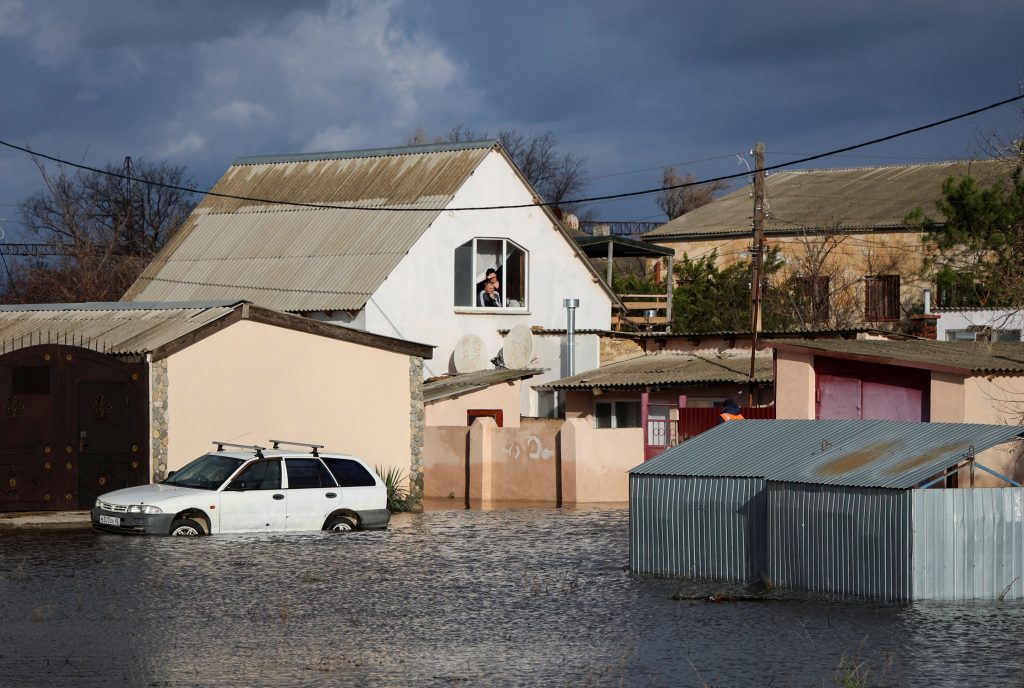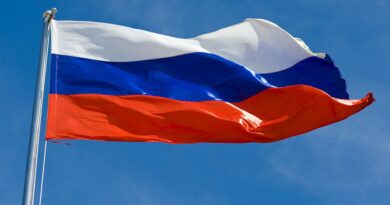Russian War Report: Pro-Kremlin surrogates accuse the US of using ‘climate weapons’ in Crimea
As Russia continues its assault on Ukraine, the Atlantic Council’s Digital Forensic Research Lab (DFRLab) is keeping a close eye on Russia’s movements across the military, cyber, and information domains. With more than seven years of experience monitoring the situation in Ukraine—as well as Russia’s use of propaganda and disinformation to undermine the United States, NATO, and the European Union (EU)—the DFRLab’s global team presents the latest installment of the Russian War Report.
Security
Multiple reports of Ukrainian drone attacks as Russia continues its assault
Finland enforces border closure with Russia in response to escalating migrant concerns
Tracking narratives
Pro-Kremlin sources spread conspiracy theory alleging US ‘climate weapons’ caused storm in Crimea
Putin unveils Russia’s AI strategy to counter Western ‘monopoly’
Multiple reports of Ukrainian drone attacks as Russia continues its assault
On November 27, sources on Telegram reported a massive explosion with subsequent detonations in eastern Ukraine’s occupied Donetsk region. It seems likely that drones of the Armed Forces of Ukraine (AFU) attacked a Russian munitions storage facility, but the AFU has not claimed responsibility for the attack. That same day, the Russian Ministry of Defense reported that air defenses detected Ukrainian drones deep inside Russia, notably in the Ryazan region. Ukrainian drones also reportedly targeted an aircraft plant in Smolensk the previous day.
Also on November 27, AFU reported twelve Russian attacks in the direction of Lyman, along with Russian assaults in the directions of Bakhmut and Avdiivka, with twenty-six and twenty-one attacks, respectively. The next day, Ukraine reported fifty-six attacks by Russian forces, with the fiercest combat occurring near Bakhmut, Avdiivka, and Marinka.
According to Reuters, tension between Russian and Indian enterprises is intensifying over the sale of oil for rupees. Russia reportedly refuses to accept a “non-convertible currency” and insists all transactions are made with China’s yuan. As a result, certain transactions are being paid in installments in various currencies, including the yuan, Hong Kong dollar, and UAE dirham. At the same time, the Financial Times reported that Turkey is increasing its exports to Russia, notably in microchips, communications equipment, and telescopic sights. US Treasury Under Secretary Brian Nelson is expected to visit Turkey imminently to hold discussions with Turkish officials on limiting this trade.
Meanwhile, Ukraine has alleged that Russian leadership spent 1.5 billion dollars on a large-scale information campaign known as “Maidan 3,” according to the Ukrainian outlet Babel. The campaign, which has not been independently verified, was allegedly designed to incite dissent, exacerbate contradictory reporting, and instill dread and terror in Ukraine. The report also alleged that Russia spent 250 million of the 1.5 billion dollars on Telegram operations.
In additional security-related news, the United States is negotiating with Greece to purchase 75,000 shells for Ukraine. It was reported that this will include 50,000 105-millimeter shells, 20,000 155-millimeter shells, and 5,000 203-millimeter shells, according to the Greek newspaper Kathimerini. The Greek army possesses 203-millimeter shells for use with the US-made M110 self-propelled artillery units. These shells are also suitable for firing from the Soviet 2S7 Pion self-propelled guns, which are utilized by the AFU’s 43rd brigade.
Meanwhile, a new photo appearing to originate from Ukrainian soldiers shows NT120 artillery mines designed for 120mm mortars, which are believed to have been sent to Ukraine by Spain. Spain rarely announces new aid packages for Ukraine, but it has previously supported Ukraine with artillery shell production.
Naval News reported on possible GPS jamming on Russian auxiliary ships in occupied Sevastopol that are systematically broadcasting signals as if they were located at Belbek airfield, many kilometers north. Radar interference patterns are visible on satellite imagery from Sevastopol.
Lastly, the Slovakian truckers union announced plans to blockade its border with Ukraine beginning on December 1. Truckers in Slovakia have threatened to close the country’s major border crossing unless measures are implemented to curb competition from Ukrainian truckers. Truckers from Poland are also seeking restrictions on Ukrainian truckers, who they allege provide lower costs for their services and carry products throughout the European Union (EU) rather than just between the EU and Ukraine. The announcement further reinforces signals coming from Bratislava that the country could curtail sending aid to Ukraine.
—Ruslan Trad, resident fellow for security research, Sofia, Bulgaria
Finland enforces border closure with Russia in response to escalating migrant concerns
On November 28, Finland announced the complete closure of its border crossings with Russia to curb an unusually high influx of asylum seekers. The decision remains effective for a two-week period concluding on December 13. Finnish authorities accused Russia of acting as a conduit for the influx of migrants, mostly from the Middle East and Africa, by intentionally guiding them toward Finland. Russia denied these allegations, insisting that the individuals attempting to cross the border have a legitimate right to do so. Earlier this month, Finland began closing most of its border crossings with Russia, leaving only the northernmost point open for processing asylum seekers.
According to Finnish officials, Russia is exploiting migrants as part of a hybrid warfare strategy to destabilize the country following its accession to NATO. Authorities reported approximately nine hundred asylum seekers crossing from Russia, an unusually high number for the country.
“Finland has a profound reason to suspect that the entry [of migrants] is organized by a foreign state,” asserted Prime Minister Petteri Orpo. “This deals with Russia’s influencing operations and we won’t accept it. We don’t accept any attempt to undermine our national security. Russia has caused this situation, and it can also stop it.”
Deutsche Welle reported that facilitators assisted in the border crossings, providing services for a fee, such as visas, language courses, transportation, and accommodations. Some facilitators asserted they had agreements with Russian border officials, claiming that these officials would stamp migrants’ passports and guide them to the Finnish border, where they could apply for asylum. Deutsche Welle identified several Arabic-language Telegram channels where administrators and other group members offer assistance in crossing the Russian-Finnish border in exchange for a fee. The DFRLab previously reported on similar tactics on Facebook in relation to migrant transit to the EU via Belarus in 2021.
—Victoria Olari, research assistant, Moldova
Pro-Kremlin sources spread conspiracy theory alleging US ‘climate weapons’ caused storm in Crimea
A severe storm system moved through the Black Sea this week, impacting occupied Crimea and parts of Ukraine and Russia, leaving millions without heat and power. Amid the storm, pro-Kremlin sources re-circulated an old conspiracy theory suggesting US-based entities were complicit in the storm’s creation.
The conspiracy theory accuses the United States of having a technological program that can control the weather. The DFRLab observed five Russian news websites amplifying this old conspiracy theory in the context of the recent storm in Crimea, including Ukraina.ru, Komsomolskaya Pravda, Don24, Crimea News, and Privet Rostov.
The news reports referenced weather manipulation against Russia and suggested a link between geopolitical events and incidences of weather disasters. Text analysis of the five reports revealed that they often used the Russian phrase for “climate weapons” (климатическое оружие). They also referenced the High-Frequency Active Auroral Research Program, the Defense Advanced Research Projects Agency, and the February 2023 earthquake in Turkey. The articles cited two sources to support the theory, including an interview in Ukraina.ru, a Kremlin-affiliated outlet, with Dmitry Efimov, former chief analyst of the Federal Security Service of Russia, and an interview in the pro-Kremlin media outlet Komsomolskaya Pravda with scientist Vladimir Polyakov. The reports also implied a connection between the February 2023 earthquake and the presence of the US destroyer ship USS Nitze in Turkey, but acknowledged a lack of concrete evidence.
The conspiracy theory also received traction on Telegram. Using the Telegram analytics tool TGStat, the DFRLab identified that the Russian phrase for “climate weapons” garnered 1,911,451 views on November 27, and found that Ukraina.ru’s report had been republished by at least six Telegram channels. The conspiracy theory pushed by these news outlets not only seeks to amplify distrust toward the United States but also has the potential to fuel climate denialism. The trend of attributing natural disasters to foreign actors can divert attention from the scientific community’s consensus on the climate crisis and allows states to evade accountability.
—Sayyara Mammadova, research assistant, Warsaw, Poland
Putin unveils Russia’s AI strategy to counter Western ‘monopoly’
On November 23, Russian President Vladimir Putin announced plans for the country to develop its own artificial intelligence (AI) strategy, warning against allowing the West to monopolize AI development. Speaking at the Artificial Intelligence Journey 2023 Conference in Moscow, Putin emphasized that Russian AI should counter Western systems and be grounded in the Russian language, traditional culture, and spiritual heritage. This echoes a narrative used in Russian propaganda that highlights the preservation of Russian culture and positions Russia as a defender of religious traditions.
Putin expressed concern that Western search engines ignore Russian culture, accusing them of promoting xenophobia. “The algorithm may tell the machine that Russia, our culture, science, music, and literature simply do not exist,” he said. “They are canceled in the digital space. Later, they can do the same with other cultures and civilizations, inserting themselves and emphasizing their exceptionalism in this space.”
Putin announced his intention to approve a national strategy for the development of artificial intelligence to counter the West’s “monopoly domination.” Three key proposals in the strategy have been revealed. First, Russian scientists should have access to next-generation “supercomputers” being developed in Russia. Second, Putin called for expanding AI technology development programs at the master’s and doctoral level in relevant universities. Third, the strategy will consider restructuring research funding and allocating resources to research in generative AI and large language models, as well as develop new academic programs. Addressing safety and ethics in technological progress, Putin referred to Russian classical writers as moral guides for researchers and proposed that Russia’s experience would contribute to shaping international ethical standards in AI. He suggested discussing these issues at the 2024 BRICS summit, which Russia will chair in Kazakhstan.
—Sopo Gelava, Research Associate, Tbilisi, Georgia
Image: People look out of the window of a house on a flooded street following a storm in the village of Pribrezhe, Crimea November 28, 2023. REUTERS/Alexey Pavlishak
This article has been archived for your research. The original version from Atlantic Council can be found here.



